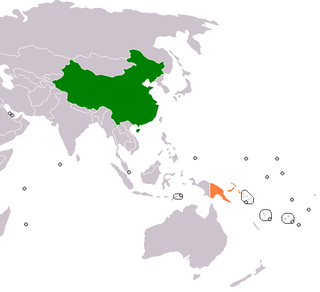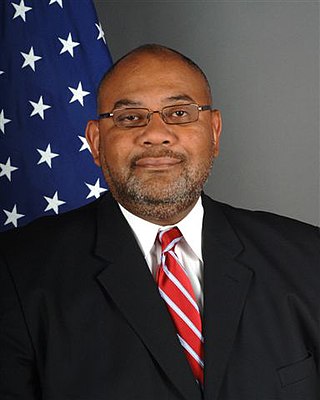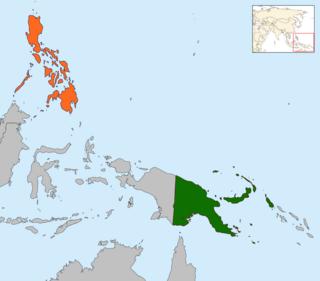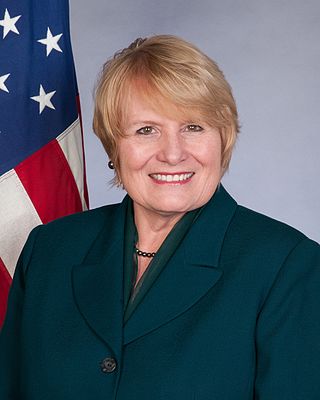
Ambassadors of the United States are persons nominated by the president to serve as the country's diplomatic representatives to foreign nations, international organizations, and as ambassadors-at-large. Under Article II, Section 2 of the U.S. Constitution, their appointment must be confirmed by the United States Senate; while an ambassador may be appointed during a recess, they can serve only until the end of the next session of Congress, unless subsequently confirmed.

Papua New Guinea's foreign policy reflects close ties with Australia and other traditional allies and cooperative relations with neighboring countries. Its views on international political and economic issues are generally moderate.
From 1916 to 1975, Tuvalu was part of the Gilbert and Ellice Islands colony of the United Kingdom. A referendum was held in 1974 to determine whether the Gilbert Islands and Ellice Islands should each have their own administration. As a consequence of the referendum, the separate British colonies of Kiribati and Tuvalu were formed. Tuvalu became fully independent as a sovereign state within the Commonwealth on 1 October 1978. On 5 September 2000, Tuvalu became the 189th member of the United Nations.

The foreign policy of Solomon Islands as of 2008 was described by the Solomon Islands government as a "look north" policy, aimed as strengthening diplomatic and economic relations with Asian countries for development purposes.

Oceania is, to the People's Republic of China and the Republic of China, a stage for continuous diplomatic competition. The PRC dictates that no state can have diplomatic relations with both the PRC and the ROC. As of 2019, ten states in Oceania have diplomatic relations with the PRC, and four have diplomatic relations with the ROC. These numbers fluctuate as Pacific Island nations re-evaluate their foreign policies, and occasionally shift diplomatic recognition between Beijing and Taipei. The issue of which "Chinese" government to recognize has become a central theme in the elections of numerous Pacific Island nations, and has led to several votes of no-confidence.

Papua New Guinea–United States relations refers to the diplomatic relations between Papua New Guinea and the United States of America. The two countries established diplomatic relations following Papua New Guinea's independence on September 16, 1975. The two nations belong to a variety of regional organizations, including the Asia-Pacific Economic Cooperation (APEC) forum; the ASEAN Regional Forum (ARF); the Pacific Community (SPC); and the South Pacific Regional Environmental Program (SPREP).

Solomon Islands – United States relations are bilateral relations between Solomon Islands and the United States. Initial relations were forged during World War II with what was then the British Solomon Islands Protectorate during the Japanese occupation, and this relationship remained strong as Solomon Islands gained its independence in 1978. Relations continued until 1993 when post-Cold War budget cuts closed the United States Embassy in Honiara. Beginning in 2022, in an attempt to counter growing Chinese influence in Solomon Islands, the United States has demonstrated increased commitment to the restoration of relations with the country. In February 2023, the United States re-opened its embassy in Honiara.

The Independent State of Papua New Guinea and China (PRC) established official diplomatic relations in 1976, soon after Papua New Guinea became independent. The two countries currently maintain diplomatic, economic and, to a lesser degree, military relations. Relations are cordial; China is a significant provider of both investments and development aid to Papua New Guinea.

Teddy Bernard Taylor is a United States diplomat. A member of the Senior Foreign Service, Taylor served as the United States Ambassador to Papua New Guinea, Solomon Islands and Vanuatu. He was succeeded by Walter E. North on November 7, 2012.

Corruption is rife in Papua New Guinea (PNG). According to The Economist, "PNG's governments are notorious for corruption, and ever run the risk of turning the state into a fully-fledged kleptocracy".

Papua New Guinea–Philippines relations are the bilateral relations of Papua New Guinea and the Philippines. Papua New Guinea has an embassy in Manila and the Philippines has an embassy in Port Moresby, which is also accredited to the Solomon Islands, Vanuatu and Fiji.

Israel–Papua New Guinea relations are bilateral relations between Israel and Papua New Guinea. Israel and Papua New Guinea established diplomatic relations in 1978, about three years after Papua New Guinea was granted independence.

Catherine Ebert-Gray is an American diplomat. She served as the United States ambassador to Papua New Guinea, Solomon Islands and Vanuatu.

Mexico–Papua New Guinea relations are the diplomatic relations between the United Mexican States and the Independent State of Papua New Guinea. Both nations are members of APEC and the United Nations.














